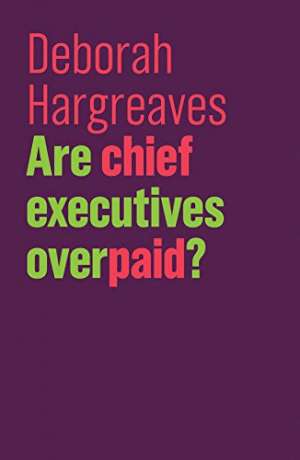25 July 2019
Are Chief Executives Overpaid?
Deborah Hargreaves
2018, Polity Press, 140 pages,
ISBN 9781509527809
Reviewer: Dame Kate Barker, Chairman, British Coal Staff Superannuation Scheme

This short book has two aims – first: to convince the reader that Chief Executives (CEOs) are indeed overpaid and why that matters and second: to propose solutions. I am not convinced that it is fully successful in either - probably because it is more of a polemic than a careful analysis.
It is certainly true that over the past 25 years or so the pay of those at the very top of companies, particularly in the UK and the US, has moved ahead much faster than that of the rest of the workforce. This has led to a big increase in the multiple of a CEO’s pay with the workforce average in many companies. Hargreaves’ analysis of the reasons for this covers the move to performance-related pay and the associated payment in shares; the shift in the 1980s to a view from some politicians and among the public that it was a good incentive if some became very rich; and the tendency for individuals to move between senior positions in government and senior positions in industry.
Having queried the argument that there is a global market for top CEO talent, she then criticises the way in which remuneration committees work. She argues that members are too often from similar backgrounds to those whose pay they are setting, and that the desire to set everyone’s pay in the ‘top quartile’ leads to an inevitable ratcheting upward. There is much truth is these points – although the argument is perhaps too sprinkled with individual examples which actually many other CEOs would regard as egregious.
It’s very difficult to answer the questions ‘are CEOs worth it?’. Someone who has built a business, or who has turned a business around successfully, might well deserve a substantial reward for the risk they have taken. However, it can also be argued that there are negative consequences from the existence of high pay – Hargreaves points out the possible link to more populist politics, and a decline of trust in business, if many people believe a few are getting very rich at their expense. In addition, she refers to the work of Andrew Smithers who argues that the move to pay based on share price performance has held back investment and productivity, though she does not explore this very deeply. Those are both sound reasons to question high pay. Others are perhaps less so – for example the prevalence of share buybacks – it may often be quite right to return funds to shareholders if they cannot be deployed effectively in a business.
If there is agreement that there is a problem, what can be done? Hargreaves refers to a number of Government initiatives in this area in the UK that have not proved effective – and points out that shareholders have not, and probably will not, prove to be the solution. Her proposed solutions include: an increase in the rate of taxation of top business (linked with a shift in perceptions so that paying tax is seen as a ‘good thing’); a statutory body focused on corporate governance; the strengthening of the focus in the Companies Act beyond shareholders; greater say on pay from employee representation; a cap on pay ratios and government using its power in awarding contracts against companies with unduly high executive pay. She also describes drawbacks of most of these.
In addition to these she proposes a considerable simplification of executive pay – to move to a simple salary with a profits-related bonus that is also available to the whole workforce. It might include an element of pay in shares to be held for a long period. As a member of two remuneration committees (one in FTSE 100 and one in FTSE 250 – please note the declaration of interest) I can see the attraction of this in time and cost saved. But I have also seen the benefit of being able to incentivise the senior management team (not just the executives) to achieve particular targets. A thoughtful set of objectives can keep the right focus on the long-term health of the business.
The debate on pay is shifting, and shareholders are having some effect on remuneration policies. It will take time, but personally I believe it is not so much rules, but more a shifting climate of public opinion, that will bring the quantum of CEO pay down.
The data used in this book it is not always well-defined – the reader is too often left wondering if the reference is just to the UK FTSE 100 or wider groups. And I was startled to read on p25 that the average pay for a remuneration committee member was £441,383 in 2015. Either this is wrongly described, or I need to put in for a manyfold increase.
